When Georgia lawmakers killed the medical cannabis oil bill in the last hour of the March 20 legislative session, Kelli and Mike Hopkins hoped any of the dozens of seizures their six-year-old son, Abe, had a day would not be his last. That the bill would be passed in 2015’s session, giving Abe a chance. Because Kelli and Mike feel like they’ve tried everything.
Now they’re left wondering, what if?
What if HB 885 had passed and Abe had been one of the few chosen to receive the cannabis oil pill? Would he still be alive?
“There were times when he wasn’t seizing,” Mike said, “and he had the potential to show progress. If it could have reduced his seizures by half, or even 25 percent, it could have done wonders for him.”
Kelli and Mike recently traveled from Covington to a medical conference in Chicago and talked with parents who were able to get their children into clinical trials of medical marijuana. Some were traveling across states to get it. Mike said some children saw a 50 percent reduction in their seizures.
“Just stopping even one is worth it,” Mike said.
At six years old, Abe could barely move, seizures stunting development from his first day. He never learned to talk.
“It was so sudden”
Kelli and Mike had been trying to get Abe and his sister Michala, 16, into Epidiolex trials, an oil pill low in tetrahydrocannabinol (THC), the component that makes you high, and high in cannabidiol (CBD), the medical component of the plant. But these trials are narrow and restrictive, hesitant to accept patients with multiple medical diagnoses. Michala lost a leg to cancer when she was 14 months old, and the seizures she has been having since she was three weeks old make it too dangerous for her to have a prosthetic leg.
“It’s not like we’ve tried one drug,” Mike said.
Kelli said they took Michala to a trial at the University of Alabama at Birmingham starting when she was a baby and would have to drive her there every other weekend. It was a lot, she said, to get her there and back, upkeep her information and chart every seizure.
The restrictions are so tight, she said, there’s no way the trials, or even passed legislature, could lead to recreational use of this medical strain.
“It’s so narrow in scope,” Kelli said, “that even if it had been passed, they may not have been chosen.”
A neurologist they go to in Atlanta can only have 25 patients for an Epidiolex trial, and Michala doesn’t fit the qualifications. If HB 885, named Haleigh’s Hope Act after a five-year-old girl with a seizure disorder, passes during the next legislative session, it will be at least a year until Michala could get the pill.
Some of their friends have moved to other states, where clinical trials of medical marijuana have been approved. At the time, the Hopkins didn’t have the opportunity to move because of the financial and logistical challenges they faced with moving a family of six, including three children with special needs. Marlee Anne, 12, is the only child without a health condition.
Michala is considered high functioning for someone with Aicardi Syndrome, a condition that causes her brain to develop without individual left and right sides. They changed her medication in March, but the drug left her unable to sit up or eat on her own. When she began to sit up again, they tried the medication again. Again, the lethargy side effect was too much for her to tolerate, so they took her off.
Recently, while visiting family in Florida, she had to be given an emergency rescue drug.
“I’m having a problem with people saying they’re against it just because it’s marijuana,” Kelli said. “We’re already giving them something that hurts.”
At times, the side effects of the myriad drugs are worse than the medication.
“It’s getting harder to manage (Michala’s) seizures,” Mike said. “If we have to move to Colorado, we’ll do it. It’s to that point. It’s hard losing a child. It was so sudden and unexpected with Abe.”
“We would have (moved) if someone had said it’s what will save him,” said Kelli, unable to fight back tears but strong enough to know sitting silent will not help Michala or Mary Elizabeth, 21 and unable to sit up or talk. “It’s not that we wouldn’t have gone to the ends of the world for him. Now we just don’t want to lose Michala, too.
“It’s not a political game. It’s a child’s life. It’s a life that’s been lost, and we don’t want to lose another.”
“It’s hard watching them”
HB 885 rolled passed every committee and the state House and Senate, with more than 98 percent of the General Assembly voting in its favor, but failed to pass in the midnight hour because of a bill State Sen. Renee Unterman (R-Buford) attached to it that did not pass in the House because of the fear the autism bill would affect insurance rates and costs.
There’s an opportunity now, Mike said. HB 885 would have been so narrow and watered down that, while it would have been better than the nothing they have now, lawmakers have the chance to write a bill that can help more people.
“They’re suffering now,” Mike said. “It’s all about getting them a better quality of life.”
Kelli said there is still work to be done before the new legislative session in January. She urged people to read about the subject and not to judge the bill on the word “marijuana.”
“Say to yourself, ‘If I had this situation with my child, what would I do?’” Kelli said. “It’s hard watching them.
“We want our friends to come home who have had to move to other states to get their kids anything that might help. We want everyone to know this is our story. The opportunity is coming up in January. Write your representatives now. Don’t want until the session begins.”
“We’re not expecting a miracle drug,” Mike said, “for Michala to sit up or for Mary Elizabeth to start doing things. Even if it’s just stopping one or two a day.”





